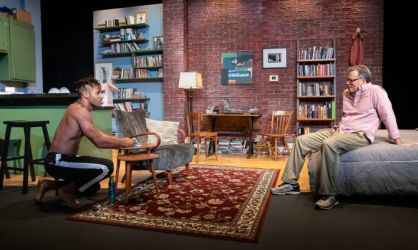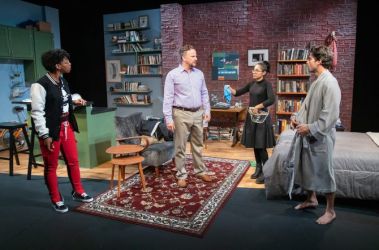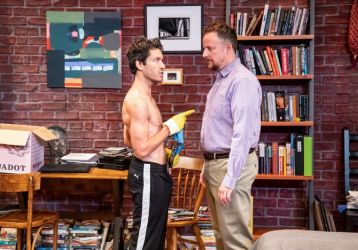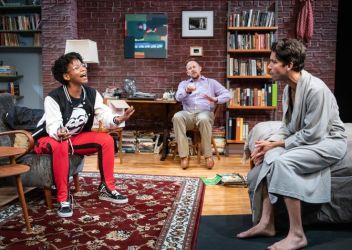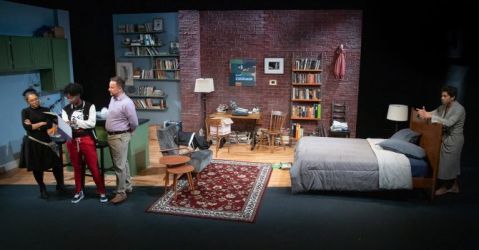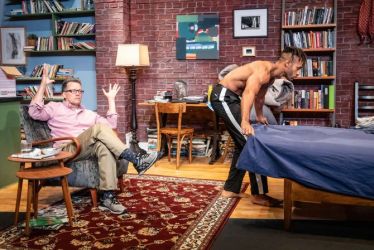Writer Erik Patterson and actors Stephen Guarino & Michael Rishwan on giving an audience a 'Handjob'
(c) Queerty.com
September 27, 2019
| By David Reddish Artistic power can hide in unlikely places. Thus is the case with Handjob, a new play which had its world premiere at the Atwater Village Theatre in Los Angeles. Written by Erik Patterson, and as directed by Chris Fields for the Echo Theater Company, Handjob opens with a titillating situation. A frustrated writer named Keith (played by Steven Culp of Gray's Anatomy) has hired a hot younger man named Eddie (Michael Rishwan, a student of New York's The New School) to clean his house. The scene plays until two new characters emerge, Kevin (Stephen Guarino of EastSiders) and Bradley (Ryan Nealy of the film Singularities) and act out almost the exact same setup on the exact same set…with no explanation.
What's really going on here? We'll not say, other than to mention that Handjob does indeed deal with a handjob (which is presented live on stage), and the blurred lines where reality can intrude on fantasy, and vice versa. Running 90 minutes with no intermission, what begins as a silly, sexy romp evolves into a morally ambiguous, provocative and graphic meditation on gender, race, sexuality and violation. Handjob opened September 7 and runs through October 28 at the Atwater Village Theatre in Los Angeles. Queerty snagged some time with playwright Patterson and actors Rishwan and Guarino to chat about the power of the piece, subverting an audience's expectations, and what happens when fights break out in the audience. Congratulations to you all. This is a far more challenging piece than I expected. It doesn't have clear or easy answers about who's right or wrong. So Erik, where did you conceive this? Erik Patterson: I've been working on this play about two years. The Echo read a draft of it a year ago, and we probably did about six readings of it before we had a cast and went into rehearsal. So I've been doing a lot of refining and revising over the course of the past year. Before that, I think I started writing about two years ago. It went through various incarnations. The original impulse was I had hired a shirtless cleaner, and was having dinner with a friend of mine. Nothing untoward happened, it was just a man to clean my apartment with his shirt off, which was lovely. [Laughter] I was telling the story to my friend, and she said "There's a play there." So I wrote. There's a lot in the play, a lot of current, hot-button issues. All of the things people were talking about like #MeToo—all of that was going on while I was writing. So a lot of that bled into the play and it became this ball of ideas. I don't get to talk to many actors who create a role in theatre. How did the part come to each of you? Stephen Guarino: We had met socially through an actor named Matt McGrath, whom I idolize. [He turns to Erik]
Maybe you thought I was interesting, but that was the only time we really hung out. Then he sent me a script while I was in New York. I was just reading it frantically, and had to read it a second time. Then I got so excited I called him and said "I'm going to play this. Nobody will do it better than me." To be fair, some other people had read it, but I was just so excited for the flip that happens [a major plot twist]. To play both sides of that: I feel like that is a fair assessment of how I feel in my own life. And what about for you, Michael? Michael Rishwan: I did audition. It came to me through a friend who's in Gloria, from last season. I'm in film school right now. So I went in to work my chops and my training, and I ended up getting it. It's been really beautiful. I'm so appreciative to be part of this process and working with these people in the play. And it's not easy material. MR: The writing itself, the mental dexterity you have to have—he's written such a play that, as an actor, I get so excited to eat his words. But there are so many different ways you can deliver his language You have to be so focused. There's a speed about it. You have to be intentional with the language. It's almost like I'm playing on a playground in a way. SG: It's a mouthful. That monologue you're given, yes. But more than that, the nervousness of the character. I'm curious as to your process: how do you get at that every night? SG: It's difficult for me because physically. I'm a lounger. So I literally just caffeinate myself for that first scene. I do ecstatic breathing, and I start doing all the ticks so that I'm in a frenzy by the time I enter the scene. I'm also thinking about everyone that's seeing it, all the people I know, and I get myself to a full nervous state. I say all their names over and over in my head. I feel like a deer in the headlights when I start. I just think you're going to fail, you're going to fail… That's a hell of a method. SG: It's great. The more nervous the funnier the situation. Usually you have to be relaxed and grounded to start a play. This is the opposite. Do you watch the show every night Erik?
EP: We're in our third weekend. I haven't seen every show, but it's my baby. I like to watch it a lot to see how it grows and changes. So I won't be watching it quite as much as we go on. But I feel very lucky that the entire cast is brilliant. To see them all bring this play to life is really fun. Every audience too—it's interesting to hear how the audience will respond from night to night. There are many arguments made in the play, and on some nights I feel like some people are more with one argument and other nights they're with another. Audiences can be very vocal. MR: It's different every single night. Really? EP: There was one night where this person in the audience kept sighing very loudly. [Laughter] He was very upset about certain things. I was like oh wow, they're feeling things. So that's fun to see: the work provoking. How does it evolve from night to night? SG: We all keep finding something new in the script every night. Honestly, it's so verbose that I will hear something new I really need to digest. It's like I really hear it for the first time. Maybe that actor really leaned into that argument. Like tonight, I really heard a lot of Tamara's stuff, and I really leaned into it, so then it was easier for me to get excited about what she was saying. I'm not an enthusiastic person– [Laughter] I have to fabricate, to a certain degree. I want to talk about the sex scenes. Obviously, doing sex or nudity on camera is very different from doing it on stage, particularly in an intimate venue. There are all kinds of different laws about what you can show. Michael, you're not in any dildo scenes. MR: No! So Stephen, when you have to do a scene where you actually have to touch a fellow actor's penis—or a facsimile of it—how do you get to a comfort level where you're able to do that and do it with people watching? SG: I probably don't hold those things too precious in the first place. In fact, I find it sort of titillating. But I will literally just think of things that turn me on in my own experience to try and recreate the shortness of breath, or the blushing, or the embarrassment of a sexual situation. I concentrate on sexual situations that were uneven.
How do you get comfortable with your fellow actors? SG: I don't really think about it, which is interesting. I just think they're doing their thing, I'm doing mine. At no point would I think I have crossed over into their space. EP: I do feel like, maybe, some of the things that happen in the play, we have a very safe space. SG: On the spectrum of people who thought intimacy coaching was necessary, I fall on the end of you gotta be f*cking kidding me. EP: But, at the same time, just from an insider-outsider—I don't act the scene. I just analyze it. I feel like you two are respectful of one another's spaces. They worked together. You would touch his knee. SG: Yeah. EP: I felt like there was a period of time where they were learning how to touch each other but it's not crossing lines. You would hold a hand or touch a knee. SG: I wonder if I would have I would have been less deliberate about that if I knew the other actor was gay. Knowing the other actor and knowing him to be heterosexual, I was very clear. I'd say "I'm going to touch your knee now to block this." That was until we got the prosthetics. That's smart. SG: But I wonder if I knew he was gay, I would have been like, I'm just going to touch this… [Laughter] But that's also so meta with the content of the play itself. I was left wondering about the rehearsal period, if any of it was added in. EP: It was all scripted. MR: I think Mr. Patterson has written a really beautiful play about the power of connection and the power of disconnection and how necessary it is for people right now. No matter what you look like, no matter how you identify, it's connection vs. disconnection. Sure, which can stir up an audience. EP: There was a moment where we had a talkback after the show. Someone in the audience said something, and Stephen was talking, and there was a little bit of back and forth. Suddenly I felt like the play was happening again. Wow. SG: It was a woman. I said something sort of in my bombastic way. And she said "I don't know if that's you or the character talking." And I said "M'am, I'm not a sociopath." [Laughter] EP: That's a good line! SG: It was just me. I wasn't offended, but I was aghast that someone would think I wouldn't know the difference.
What's so funny about that is that is what the play is about: the nebulousness of boundaries particularly in a situation where you indulge a fantasy, be it the shirtless guy cleaning house or working on a set. I read a story from an actress recently who described an instance on a set where she played a scene with another actor. She was supposed to have a shocked reaction, so her fellow actor took a water bottle and sprayed water up her skirt into her snatch. So she screamed and reacted, and it might even be the take in the film. Related: MJ Rodriguez kicks down a new door with her new role in 'Little Shop of Horrors' I mention this because she felt really violated. At the same time, you hear about other actors who will come out naked to shock a fellow actor. Or guys actually hit each other. Or actors really French kiss. So my question is when you're in a creative space like this, how do you still respect one another's boundaries? EP: You talk. There has to be a lot of dialogue. We knew going into this rehearsal process that we were making a play called Handjob with an actual handjob in it. So we didn't ignore the fact that there's a handjob in it. SG: It's so hilarious. We get audiences because of that. They think it's going to be a sex show. EP: Absolutely. I think that the handjob is the Trojan horse to get those people into the theatre, but there's a whole lot more going on in the play than that. The handjob is a big shiny object. I once saw this gay play—a "sexy" gay play—before I wrote this. It made me so mad because the play wasn't about anything. I think it thought it was, but it really wasn't. But tickets sold? EP: Out the wazoo. But I went to this play, and people were running to go see it, because it was so sexy. Which is great, but I wanted something to go deeper. SG: I will also say this: I have never been in a situation where I felt anything uncomfortable on that level. I've had race issues come up, where certain conversations I had to be taught a different language, and I was embarrassed. But that all happened within a conversation. I have kissed, I have had sex with women—nobody has ever come up to me as a gay man and said "Ok, now you're going to touch her. Now you're going to kiss her." Nobody has ever asked me. That's interesting. I talked to Rupert Everett last year, and he has had directors tell him how to touch a woman. And he would say "You know I'm bi, right?" [Laughter] SG: I just think nobody has ever been concerned about me as a gay man touching a woman. Are you ever concerned for your own safety? SG: I'm trying to think of any time. I remember once I was in character and a person said "Don't touch me. I'll get AIDS." But that person was trying to be funny, and they're an idiot. I was caught off guard, but not offended. I just thought what a poor choice of words. That's the only time I can really think of.
That's probably a good thing for you. The most provocative line in the whole text is in the final scene where one character says "I don't want to teach you." What interesting about that is that so much of the plot and meta-plot are about teachable moments and misunderstandings. The laziness isn't just someone not wanting to listen, it's someone not wanting to explain their feelings. That just fuels frustration. So, how do we get around that? EP: One of the things I really want to leave audiences with is that there's a lot of talking in this play, and not a lot of listening. At the end of the day, we all need to listen more especially to people who represent groups we are not part of. Straight people need to listen to gay people more. White people need to listen to people of color more. There's a lot of not listening happening. So what happens the next day? EP: That's another play. I don't have an answer for that. Michael, what do you think? Your character closes out the play with his exit. MR: I don't even know the answer to that question. It's the notion of connection vs. disconnection. I don't know if Eddie is going to write stuff, or have second thoughts. I leave that open to the audience. In the same way as Mamet's Oleanna, the audience ends up projecting their own experiences onto the characters and ultimately has to ask: What am I seeing here? It's about perception. EP: I don't know what they all go through the next day, but I hope that the next day the audience is still thinking and talking about all these things. All photos by Darrett Sanders. Handjob, presented by the Echo Theatre Company, runs until to Oct. 28 at the Atwater Village Theatre in Los Angeles. |
Unless otherwise noted, all captures were made by me from videos from various sources. All shows and photos belong to their respective owners.
NO COPYRIGHT INFRINGEMENT INTENDED!
© 2004-2022 SConTV.com and Steven-Culp.com
